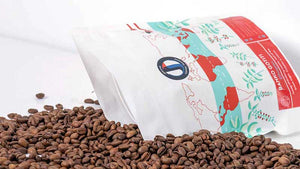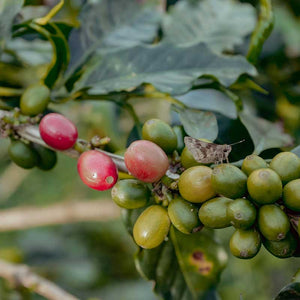
Spotlight on Maya
This is an absolute cracker of a coffee. A favourite as an espresso based drink. Add milk and it tastes of butterscotch and caramel. It's also great as a full bodied cafetiere, with plenty of richness.
The farm of La Bendición is situated at 1900-2100masl in Sansare, department of El Progreso. The climate here is sub-tropical rainforest, with an average rainfall of 1.800mm and soil that is a mixture of volcanic pumice and clay. It is owned by José Gómez, who has been growing coffee in this region for the past 20 years, and operated by his son, who has the same name. The farm grows coffee alongside other crops such as corn, potatoes and tomatoes, and employs 15 workers. Harvest here is between April and May and the cherries, once picked, are taken to Beneficio La Esperanza for processing.
The Beneficio La Esperanza wet mill owns a fleet of 40 trucks, which travel a 60km radius outside of the region of Antigua to collect the coffee cherries. They travel into Acatenango, Chimaltenango, Palencia/Sierra de las Minas, Friajanes/Santa Rosa, Lake Atitlan and Antigua. The routes are planned at the beginning of harvest, though they are sometimes changed for safety and security reasons. The trucks leave in the mornings as they often have to travel up to eight hours to reach their destination. Small producers and communities are made aware of when and where the trucks will show up and bring their cherries to the weighing stations to be tagged and weighed. The producer is given a receipt for their cherries and these are assigned a number for tracking. This number will follow the coffee all the way through processing, sampling and lot building.
The trucks travel back to La Esperanza and usually arrive late at night. There, the cherries are loaded into the mill and moved with water into large tanks. Low-density floaters are siphoned off to be processed separately. Samples of the high-density cherries are taken to be measured before depulping. This density measurement dictates the fermentation process.
The cherries are run through depulpers, a crib and then into fermentation tanks. Fermentation generally takes between 12 and 36 hours depending on the density of the cherry, amount of coffee in the tank and, of course, the coffee itself. Beneficio La Esperanza is equipped with 12 tanks and the building is temperature controlled to ensure a consistent environment.
Once fermentation is complete, the coffee is washed and moved in water channels to the pre-dryers. These do an initial wicking away of moisture from the coffee and aid in the consistency of the drying phase. The coffee is then moved to one of the two large concrete drying patios.
Drying takes between 10 and 21 days, depending on the coffee and its intended purpose. Parchment is continuously moved on the patio to ensure even drying, and adjustments are made based on the coffee and the weather conditions. When it reaches the designated moisture percentage, it is moved to mechanical dryers to be finished. Here the moisture levels are fine tuned – the coffee is usually in the dryers for no more than three hours.









